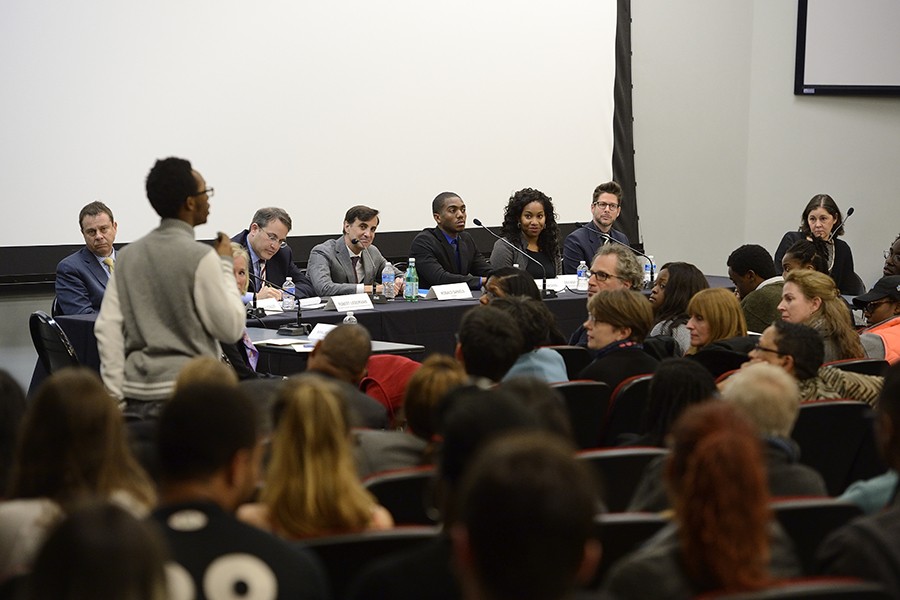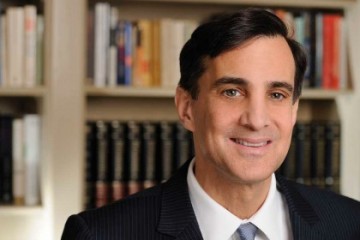Members of the Johns Hopkins University community gathered at Hodson Hall on Monday night to discuss issues of race on campus, a formal follow-up to a student-led campus protest just more than two weeks ago.
The event, The Black Student Forum, was hosted by JHU's Black Student Union. Mieka Smart, a JHU faculty member who moderated the discussion, set the stage for the evening: "Our goal in this room is to keep it safe and to have an honest conversation that's going to stay alive after we leave those doors."
The conversation lasted for more than two hours, covering topics ranging from faculty diversity and hiring practices, to cultural competency, to concerns about harassment and hate speech.
BSU president Matthew Brown opened by revisiting a list of demands presented to JHU President Ronald J. Daniels on Nov. 13. He said the list reflected "issues that have been seen before," citing similar demands presented to JHU's administration by members of the BSU in 1968 and describing the feeling of marginalization on campus as "an endless cycle that we are trying to break."
Added junior Tiffany Onyejiaka, vice president of the BSU: "Being a black student at Hopkins adds an extra dimension of difficulty. Every student deals with difficult classes and harsh grading curves, but black students also have to deal with discrimination and erasure in various aspects of campus life."
Called on to address the student's demands, Daniels pointed to the new Faculty Diversity Initiative, a multimillion dollar effort designed to help each of the university's divisions find, attract, and retain the most talented faculty representing a broad diversity of backgrounds and experiences. The effort, unveiled earlier Monday, has been in the works for more than a year.
Also see: President Daniels on The Black Student Forum (The Johns Hopkins News-Letter)
In response to a question suggesting that the initiative could lead to more qualified candidates being passed over, Provost Robert C. Lieberman said: "I would very, very strongly resist the premise of your question, which is that sometimes diversity and excellence or standards are opposed to each other. They in fact reinforce each other, and we will only be excellent to the extent that we are diverse."
Daniels pledged transparency on the topic in the form of a report on the composition of the faculty, to be issued every two years. He also announced plans to strengthen the university's Center for Africana Studies with the addition of five new faculty members—two in the center, two in the Department of History, and one interdisciplinary scholar.
One of the students' requests was for a mandatory cultural competency course for all undergraduates. Daniels said that a single course required for all students "goes against the grain of choice that is embedded in our curriculum," but that "other approaches to that issue are on the table." He said possibilities open to discussion include establishment of a distribution requirement, mandating that students choose from among a set of courses in which cultural differences are considered.
Daniels also backed establishing a comprehensive diversity training program for the faculty, staff, and all students. A pilot training program was implemented at student orientation this past fall, and a working group to develop training recommendations will be launched by the start of the spring semester.
Several students spoke up with concerns about hate speech and urged accountability for students and faculty members who harass black students. In particular, they cited the popular social media app Yik Yak, where anonymous racist comments targeted at black students have made many members of the campus community feel unsafe in recent months.
Daniels noted that there is a constitutional protection for speech, even if that speech is offensive, but not for threats or hate speech. He said there is a process by which the university can work with Yik Yak administrators to root out those responsible for hate speech or comments "akin to incitement," which Daniels said "should not be protected on a campus."
Caroline Laguerre-Brown, vice provost for institutional equity, spoke about campus harassment perpetrated both by faculty members and students. Responding to a complaint "isn't a science," she said, but the Office of Institutional Equity will intervene to assist students who feel targeted.
Several Johns Hopkins alumni were in attendance, among them Kobi Little, a 1994 Johns Hopkins graduate and former BSU president. Near the end of the event, he stood to ask a question of the panel but first addressed the students in the audience.
"I'm proud of you," he said. "You shouldn't have to be here today, but I'm so glad that you have the courage and the determination to be here and to stand up and speak truth to power."
Monday's event was planned following a Nov. 13 protest led by the Black Student Union at which more than 100 students demonstrated solidarity with students protesting racism at the University of Missouri and across the nation and also voiced their frustration with racial injustices on their own campus.
"I am optimistic about tonight's panel leading to real change and progress on campus," said Lamin Sonko, a JHU senior who attended Monday's event. "I commend the BSU for organizing this and having the courage to confront the university on the issue of social justice."
Added Kevin Shollenberger, vice provost for student affairs: "Feedback from the Hopkins community is essential to promoting a culture of inclusivity on our campuses. We were glad to have the opportunity for an open dialogue with students, faculty, and staff."
In addition to Daniels, Lieberman, and Shollenberger the panel of university administrators also included Maureen Marsh, secretary of the university's board of trustees; Beverly Wendland, dean of the Krieger School of Arts and Sciences; and Ed Schlesinger, dean of the Whiting School of Engineering.
"What I hope we all take away from tonight is a sincere commitment to look closely at these issues," Daniels said. "… We'll work together to figure out how to take those next steps."
Posted in University News, Student Life
Tagged diversity, race relations











